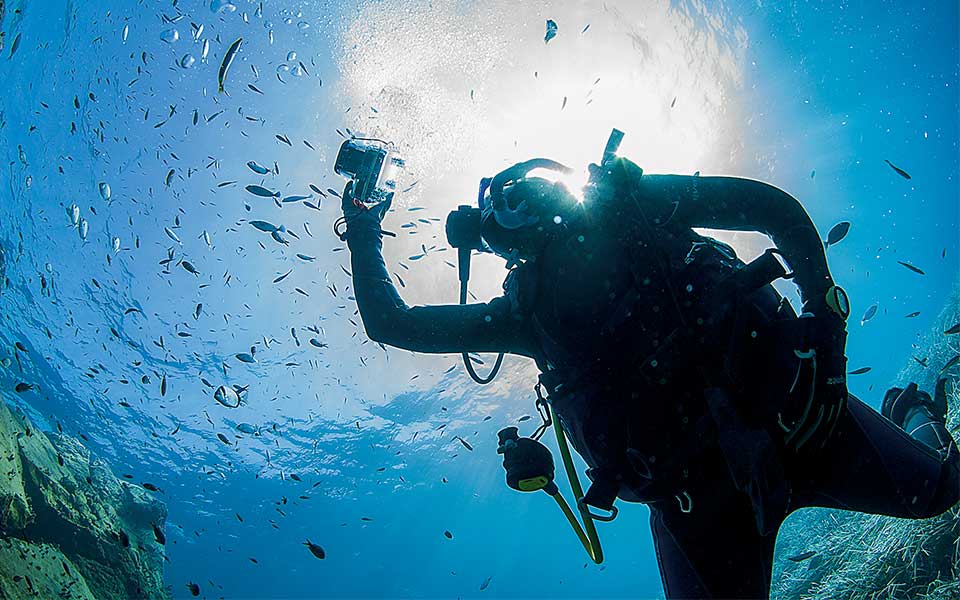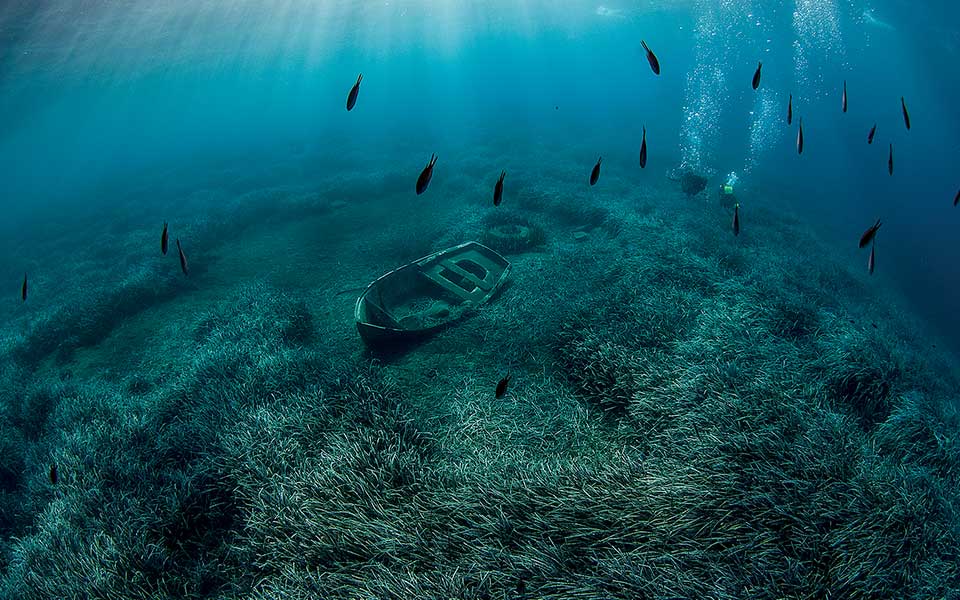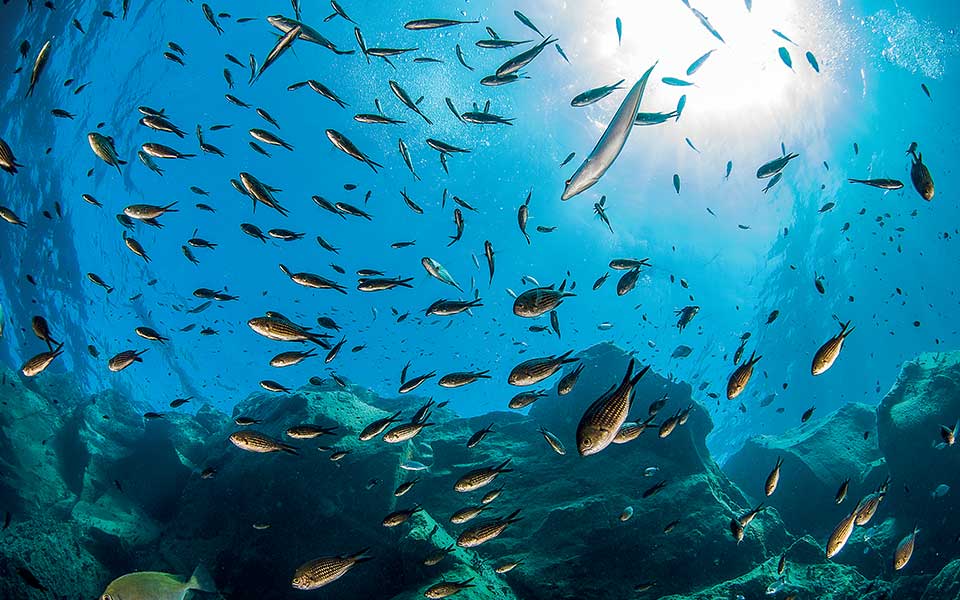Over the last decade, people from different disciplines – fishermen, scientists, conservationists and maritime professionals, people who are mostly locals and predominantly marine users – have joined forces to work together to get the seas surrounding Santorini designated as a marine protected area.
The continuous and irreversible degradation of the natural environment through the overexploitation of resources (especially fish stocks), unregulated and chaotic development, the increasing pollution and the ubiquitous presence of non-reusable plastics have drastically changed the unique seascape and landscape of this famous volcanic Aegean island. These alarming facts have sparked initiatives such as the founding of Thiraiki Thalassa, a local NGO seeking the formal establishment of a no-fishing zone in the waters around the southwestern peninsula of Akrotiri, one of the most pristine parts of this cosmopolitan island.
Unfortunately, this effort has yet to yield legal and binding regulations, despite the long hard work towards that end. Today, more than ever, urgent measures directly contributing to the preservation and protection of threatened and overfished marine species and of degraded habitats are needed. It is to be hoped that the joint efforts being carried out have forged a broad and solid alliance and established a common vision among numerous and seemingly opposing stakeholders. The achievement of a sustainable, healthy and inclusive future for the generations to come has become the expressed wish of a majority of the local community and other interested parties and individuals.
At the same time, Santorini is one of the most popular destinations in Greece, with millions of visitors throughout the year. Tourism has become both a blessing and a curse for the island, bringing in billions of euros to the local economy, but also taking a huge toll on its resources, its natural environment and even its urban landscape. Nonetheless, visitors, along with local professionals and policymakers, can help make a difference. Their choices can shape the supply and demand of tourist services and establish prerequisites for a sustainable future, and for returning the deteriorated natural marine environment and vulnerable ecosystems to their former healthy and resilient condition. Responsible and sustainable tourism can play a key role in achieving this goal.

© Yiannis Issaris
The marine environments surrounding the island, both the areas within and outside its famous caldera, constitute a spectacular seascape to visit, with minimal if any negative consequences for marine habitats if such activities are carried out responsibly. Scuba diving is an eco-friendly activity, fully consistent with the preservation of the marine environment, and one that offers the potential to sensitize, engage and inform the visitor on crucial conservation needs and priorities.
In recent years, the island’s small-scale fishermen, for whom the overexploitation of marine resources has meant bringing in ever-diminishing catches, have started to invest in fishing tourism, a relatively new initiative that’s also supported by the EU’s Common Fisheries Policy. Rather than overexploiting the environment to the point of a possible collapse of fish stocks, Santorini’s fishermen have started to modify their activities and avoid industrial-scale fishing practices. Instead, they are inviting visitors to explore fishing methods practiced for millennia in the Greek seas, thereby establishing sustainable livelihoods with a far less destructive environmental impact.
Responsible seafood consumption is crucial as well in conserving resources and preserving the unique marine habitats of the Aegean. Beyond simply complying with EU and national legislation that protects certain species and bans the fishing and selling of undersized fish, consumers should be aware of additional measures they can take, such as not ordering particular seafood items at certain times of the year, or not eating those species at risk of extinction.
A great number of fish species, famous as local delicacies, constitute irreplaceable elements of the Mediterranean marine ecosystems. This is the case for the dusky grouper (Epinephelus marginatus), a marine predator equivalent to the wolves or tigers of the terrestrial environment, which is still sold as a specialty in many fish restaurants. Apart from the grave consequences of consuming top predators that bio-accumulate toxic metals and pollutants (most of which are man-made), the extensive removal of such species, whose primary ecological function ensures prey population regulation and balance, degrades the whole ecosystem and leaves it seriously vulnerable to both existing and future threats, including climate change and bio-invasions. Groupers are, of course, only one example, since most commercial fish stocks in Greek seas have been assessed as either fully exploited or overexploited. Detailed information for responsible seafood consumption may be found in several guides available from Greek environmental NGOs such as iSea.

© Yiannis Issaris
Apart from responsible seafood consumption, locals and visitors need to readjust their culinary preferences so as to include a range of new invasive and alien species that are seriously affecting the health of Mediterranean marine ecosystems. The Red Sea rabbitfish (Siganus sp.), for example, which has well-established populations in the waters of the Aegean, is discarded by most fishermen, but in Cyprus, it’s considered a prize catch.
These invasive species have a serious environmental impact as algae grazers with no predators in the degraded marine environment of the Aegean. The excessive presence of rabbitfish and the spread of other, similar, species further contribute to the overall desertification of the once rich and diverse marine habitats of the Mediterranean. This autumn, the environmental NGOs iSea and Thiraiki Thalassa, with the support of the Cyclades Preservation Fund, will hold a workshop in Santorini which will also include a culinary event to promote the fishing and marketing of those invasive species that have a serious impact on the marine environment but are perfectly safe for human consumption. The workshop will provide information on alien marine species and how to mitigate the damage they cause, while a specialist chef will demonstrate, for local seafood restaurants, new recipes using invasive species.
Santorini is an extraordinary place, with a unique marine environment and an amazing landscape (that emerges from and dives into a caldera) with lunar cliffs and breathtaking vistas. Despite the pressures and threats it faces, the island can retain its rich natural character. Actions such as those described here, coupled with a commitment from the local populace, can help steer mass tourism in a better direction and ensure a sustainable future for the island and the Aegean.












